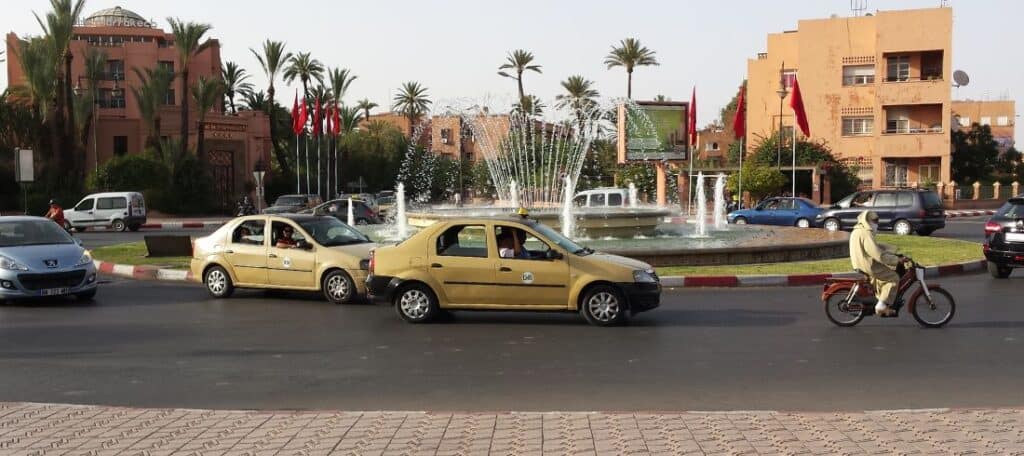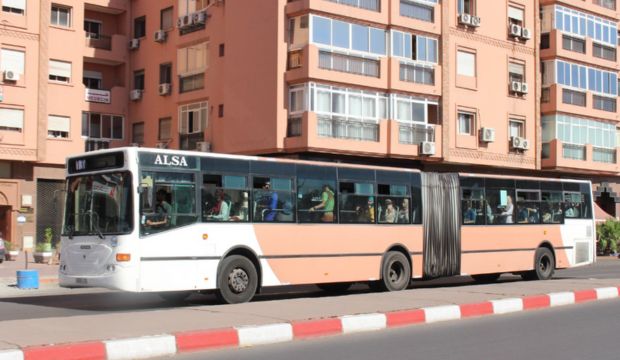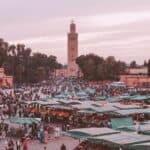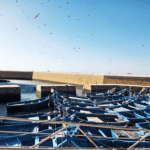
To enjoy the busy markets and quiet deserts of Morocco, it’s important to learn how to get around. Navigating the winding streets and wide-open spaces requires skillful movement. Exploring such a unique culture is exciting but may also feel uncertain.
One key aspect is understanding public transportation in Morocco. Hailing a taxi is straightforward, similar to many other parts of the world. However, the trains, while charming, can be a bit mysterious to newcomers.
With good travel tips, moving around in Morocco becomes easier and enhances the adventure. This is why a robust Morocco transport guide is indispensable for intending adventurers. Whether you’re exploring the Medina of Marrakech for the first time or are an experienced traveler heading to the sunny coasts, having key transportation tips can make your trip unforgettable and save you the stress of the unknown.
- Discover essential morocco travel tips to ease your journey across this dynamic landscape.
- Learn how to use public transit in Morocco. It will make your travel efficient.
- Learn the key differences in Morocco’s taxi systems. Learn how to navigate them with confidence.
- Understand the good and bad of various transport options. This will help you make informed decisions while getting around in Morocco.
- Get the benefits of a complete Morocco transport guide. It’s designed to reduce travel hassles.
- Equip yourself with practical knowledge to seamlessly blend into the local commuting culture.
Exploring the Moroccan Railway: Comfort and Connectivity
The esteemed ONCF (Office National des Chemins de Fer) leads the Morocco railway. It offers a vast train travel system across the country. The network is a key mode for train travel in Morocco. It efficiently connects cities and tourist spots. This lets passengers easily travel from Tangier to Marrakech and other major cities.
Let’s look at the advantages of train travel in Morocco. Comfort and scenery are key. Passengers can relax in the well-appointed seating areas. They can enjoy the picturesque landscapes outside their windows. They can use the various onboard amenities. Travelers may face delays. But, the Moroccan train system is still a top choice. It’s reliable for connecting vast stretches of the nation.
To aid riders, the table outlines key details. These concern routes, ticket prices, and schedules. They show the benefits of using the rail for long trips in Morocco.
Passenger review: “I picked the Moroccan railway easily. It was not just on time, but the journey was comfortable. It showed me rural and coastal views that capture Morocco’s heart.””
Any traveler in this majestic country should consider the Moroccan train system. It’s for their intra-city voyages. The mix of efficiency, pretty views, and easy access show the value of this mode of transport. They highlight the benefits of traveling by train in Morocco.
Bus Travel in Morocco: An Insight into Local Life
Traveling Morocco by its strong bus system offers a real glimpse into local culture. Bus travel in Morocco is both cheap and vital to the daily lives of Moroccans. It is a rite of passage for anyone seeking to understand the country from a ground-level view.

Affordability and Accessibility of Moroccan Buses
Local buses in Morocco are affordable. This makes them a great choice for budget-conscious travelers. The buses have extensive coverage. They go to both urban and rural areas. They ensure that even the most remote places are within reach.
- Low-cost tickets compared to other modes of transport
- Wide network reaching various regions
- No need for advance booking, accommodating spontaneous travel plans
Moroccan buses are cheap. They also allow for unique interactions with locals. It offers an immersive cultural experience that other forms of travel do not provide.
Navigating the Schedule and Potential Delays
Understanding the timing and reliability of buses is critical. It is a key tip for using buses in Morocco. Travelers should prepare for a schedule that is less strict. It is less strict than in other countries. Delays can and do occur, often influenced by factors such as weather or heavy traffic.
- Check the most up-to-date schedules at local bus stations
- Ask locals for advice, as they often have first-hand knowledge of the bus timings
- Plan for extra travel time to accommodate unexpected delays
Despite the unpredictability. Embracing the local tempo can lead to a more real travel. It reflects the true pace of Moroccan life. Patience and flexibility are key when engaging with bus travel in Morocco.
Advantages include affordable fares and a broad network connecting cities and towns. Challenges include less strict schedules, overcrowding, and varying levels of comfort and amenities. But, there’s also the potential for cultural immersion and local interaction.
In conclusion, wise travelers invest time in understanding the Moroccan bus system. They also learn how to navigate it. They can reap the social and economic rewards of this communal travel method. Like any adventure, adaptable people will find bus travel in Morocco enriching. They also need to be open-minded. It’s part of their exploration.
Tips on Transportation in Morocco: Mastering the Taxi System
Explore the streets and landscapes of Morocco. You can learn about its complex taxi system. This can improve your trip.. Taxis are everywhere. They are a lifeline for traveling short and long distances. Here, we cover the Moroccan taxi types. We’ll talk about navigating grand taxis and petit taxis. We’ll also share essential tips to make your journey smooth.
Distinguishing Between Grand Taxis and Petit Taxis
Two main types of taxis operate in Morocco. There are spacious grand taxis and more compact petit taxis. Grand taxis fit up to six passengers. People use them for long trips between cities or rural areas. Petit taxis, on the other hand, are for city travel and can carry up to three passengers. It’s crucial to recognize which type you need based on your destination.
There are two types of taxis. Grand Taxis can hold up to 6 passengers. They serve inter-city and rural areas. Their service area varies by region. Petit Taxis can hold up to 3 passengers. They serve within city limits. They are typically beige.
How to Secure a Fair Fare: Bargaining Techniques
Bargaining with taxi drivers is an art in Morocco. Before stepping into a taxi, it’s wise to agree on the fare to prevent any misunderstandings later on. If there’s a meter installed, ask the driver to use it. Passengers share grand taxis with others. It’s customary to pay a fixed fare for a seat. But, if you prefer a private trip, negotiate the price beforehand.
Tip: Look up average fares between destinations. Use this information to arm yourself during negotiations. It will ensure you’re paying a fair rate.
Safety Precautions in Moroccan Taxis
Your safety is paramount when using taxis in Morocco. Always opt for clearly marked taxis, and be wary of those who aggressively offer services. It’s best to sit in the back seat and keep your things close. Also, don’t share a taxi with strangers if you’re alone. This is especially true at night. Furthermore, you can always note the taxi’s license number as a precaution.
- Choose marked taxis for identifiable service.
- Negotiate fares before the ride.
- Keep valuables secured and out of sight.
- Be cautious when traveling solo.
With these insights, you are ready to navigate Morocco’s roads. You now understand the taxi system. You know about taxi types, bargaining with drivers, and taxi safety.
Self-Driving in Morocco: Renting a Car for Freedom and Flexibility
Renting a car in Morocco offers unmatched freedom. You can explore the country’s rich landscapes at your own pace. You may plan to lose yourself in the winding alleys of ancient medinas. Or, venture into the sprawling Sahara. Or, wind through the peaks and valleys of the Atlas Mountains. A private vehicle offers the flexibility that other forms of transport may lack. Driving yourself in Morocco means creating your own travel story. You can detour for a photo, pause for a roadside café, or seek hidden gems off the tourist trail.
Self-driving in Morocco also means being ready for surprises. This could be a chance encounter with a nomadic shepherd. Or, a sudden view of green valleys. Or, the spicy smell of a market. Renting a car in Morocco does not just take you from A to B. It immerses you in the rhythms of Moroccan life. Drive through this North African land. Each mile weaves into your Moroccan adventure. It provides stories to tell for years to come.
FAQ
What are some tips for transportation in Morocco?
When traveling in Morocco, you must learn about the many transportation options. These include trains, buses, taxis, and car rentals. Understanding their advantages and disadvantages will help you navigate the country more efficiently.
How does the Moroccan railway system work?
ONCF operates the Moroccan railway system. It connects major cities and tourist spots along the Atlantic Coast. Trains offer comfortable seating, scenic views, and onboard amenities. But, occasional delays may occur.
Are buses a reliable mode of transportation in Morocco?
Buses are common and cheap in Morocco. They let you immerse in the local culture. However, they may not always follow strict schedules, so delays are common. It’s important to plan accordingly and be flexible.
What should I know about taxis in Morocco?
Taxis are a convenient mode of transportation, especially for shorter distances within cities. Grand taxis and petit taxis serve different areas and have varying passenger capacities. Bargaining is common, and we provide tips on securing a fair fare. Also, remember to focus on your safety when using taxis.
Is renting a car a good option for exploring Morocco?
Renting a car gives you freedom. You can create your own itinerary and visit remote areas. We offer advice on renting a car. This includes tips on rental companies, needed documents, and driving. These tips help ensure a safe and pleasant experience.








